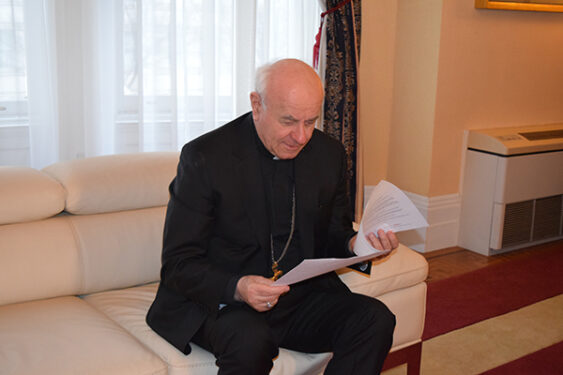
‘We were all in the same storm but we were in different boats’
UPPER EAST SIDE — A Vatican official visiting the U.S. to focus on health care issues is calling on the medical establishment to do a better job of balancing science and humanity in the treatment of patients.
The scales are tipped toward science and technology at the expense of the human touch, said Archbishop Vincenzo Paglia, president of the Pontifical Academy for Life. The academy, established by Pope John Paul II in 1994, works to promote and defend the value of human life.
“We seem to prefer technology. Technology and scientific advances are important, of course. But technology doesn’t heal,” Archbishop Paglia told The Tablet during an interview on March 30 in an Upper East Side townhouse owned by the Holy See’s United Nations envoy. The archbishop, who is Italian, does speak some English but preferred to talk to The Tablet through an interpreter.
The world will be able to handle the next pandemic after COVID-19, but only if doctors treat patients with “the human dignity they deserve,” he said. Patients are more likely to have better outcomes when they believe they are being truly cared for and are not just a name on a doctor’s chart, he added.
Earlier that day, Archbishop Paglia was the keynote speaker at a conference on health care inequities sponsored by SOMOS Community Care, the network of healthcare providers treating Medicaid patients in immigrant communities in Brooklyn, Queens, Manhattan and the Bronx. SOMOS is Spanish for “We Are.”
The inequities in health care stem largely from economic factors, he said. Noting that low-income patients with few monetary resources were hit especially hard during the COVID-19 pandemic, he said: “We were all in the same storm but we were in different boats.”
The key to better health care is to treat everyone “with the dignity that God gave us,” Archbishop Paglia said. In the case of COVID-19, that includes ensuring that everyone is vaccinated, he added.
Archbishop Paglia said he was impressed by the job SOMOS did during the height of the pandemic — treating patients in places like Elmhurst, Queens, the city’s epicenter of COVID-19. “SOMOS understands the dignity of the patient,” he said.
According to the city’s Department of Health (DOH), more than 27,000 COVID-19 cases were reported in Elmhurst during the pandemic. The agency said approximately one in three people in the community contracted the virus. The death rate in Elmhurst was higher than the city’s overall death rate.
SOMOS treated approximately 250,000 COVID-19 patients in the four boroughs that it services, said SOMOS CEO Mario Paredes. The organization administered 500,000 COVID-19 tests at 60 testing sites and operated 50 pop-up vaccination centers.
“From the very beginning of the pandemic, we realized that we had to send the people out to the streets and be right where the community is, speaking their language and respecting their culture,” Paredes said, adding that SOMOS spent a great deal of time in Hispanic and Asian communities.
“The pandemic was so traumatic for all — especially for the poor,” he said.
The pandemic did have a positive effect, Archbishop Paglia said, because “It showed us that we are all fragile. And if we are all fragile, we understand our common humanity and we can take care of one another.”
